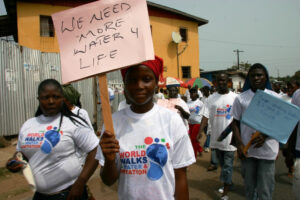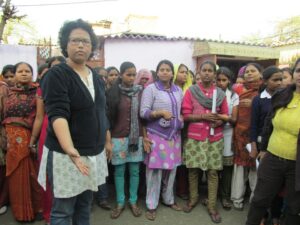I was watching a video of one of my favorite dancers, the late Sybil Shearer, who said in this interview with dance critic, Walter Terry, “I realized I was on this earth to find magic and to be part of the magic of the unknown.”

Later, Shearer wrote,
“The passion that has so long possessed me of being different… of being independent, has mounted so high that it insists on my believing that [my emotions] were not intended to be expressed by any of the present existing arts, but could only be revealed to the world in a new form of art, a new language of expression.”
Shearer explained what dance meant for her by saying that
“A performance for me was a complete emptying out, [after which] I had to have time to recuperate in order to have the full amount to give the next time. This balance of emptying out and filling up again has stood me in good stead, so that I not only still feel like giving, but actually can give, to the world in general and to certain individuals in particular.”
Sybil Shearer was one of the most free-spirited individuals to emerge from the early years of American modern dance. Born in Toronto in 1912, and raised in New York, she was among the first modern performers to tackle spiritual and social justice issues, including, in one of her dances, the plight of factory workers.
Dance has often been used as an instrument of expression for social justice, as well as protest. The One Billion Rising movement taps this idea in a brilliant way. On 14 February 2013, activists, writers, thinkers, celebrities and women and men across the world came together to demand an end to violence against women. We saw the break-out energy of women across the world participating in flash mobs and flash dancing the occasion of V-Day/One Billion Rising.
The event was sparked by V-Day founder, Eve Ensler who said “I refuse to watch as more than a billion women experience violence on the planet.” Hence one billion women, and those who love them, walking out, dancing, rising up and demanding an end to this violence.
An article by Corinna Wu in the Winter 2013 issue of Stanford Social Innovation, shared the findings of a research study undertaken to determine how the activities of civil society drive progress on human rights issues. In a comprehensive study of policies in 70 countries undertaken by political scientists Mala Htun of the University of New Mexico and S. Laurel Weldon of Purdue University, they found that mobilization by feminist movements has the most enduring impact on policies to eliminate violence against women.
The study is one part of a comprehensive project supported by the National Science Foundation to review laws and policies related to gender equality around the world. In addition to the issue of violence against women, the researchers have examined policies and laws related to reproductive rights, mechanisms to promote political representation family law, maternity and parental leave and child care.
In undertaking this work, Htun and Weldon engaged a research team to complete a large-scale survey that tracked policy development over a 30-year period for each of the 70 countries. Using information from government documents, reports from international organizations, and secondary literature, the team created a global snapshot of policies combating violence against women.
Among other findings, the researchers determined that progressive policy change regarding this issue is created by movements explicitly seeking to elevate women’s status and expand women’s opportunities – and that are independent of political parties and government. What is critical in these findings is that changes in policymaking rely on a significant political constituency for change. The study also strengthens the argument for building the capacity of women’s rights organizations and ensuring they have the organizational capacity to sustain their work
So, this global advocacy by women’s rights organizations across the world, such as that for V-Day with the dancing and agitating, is made possible by women’s organizations that are well organized and highly networked and able to mobilize people quickly.

Women and men will also be on their feet in a few weeks for another critical human rights issue. An estimated 1 billion people still do not have access to safe drinking water and 2.5 billion people lack access to basic sanitation services. As with many challenges in development, women and girls are disproportionately impacted by scarcities of clean water and adequate sanitation.
Women are more than twice as likely as men to be responsible for water collection and, on average, women in the developing world walk six kilometers each day to collect water, time which could be spent in school or at work. Studies show that more than half of girls who drop out of primary school in sub-Saharan Africa do so because of a lack of separate toilets and easy access to safe water.
Hundreds of thousands of Africans will join with people across the world to take action to call for an end to the water and sanitation crisis on the 20th anniversary of World Water Day on Friday the 22nd of March. To mark this moment, the World Walks for Water and Sanitation campaign has released a new film to inspire the public everywhere to join the world’s largest global mass mobilization movement for change. The video can be viewed at worldwalksforwater.org.
With a month to go, over 170,000 people are already planning to take part in walks in 25 countries including in Sierra Leone, Liberia, Nigeria, Uganda, Kenya, Zambia, Malawi and Madagascar. They will be walking in solidarity with the millions of Africans involved in The World Walks for Water and Sanitation events. These events are part of the Keep Your Promises campaign to encourage governments to honor the commitments they’ve made to finance and provide access to water and sanitation.
This organizing and mobilizing is a critical component in securing the policy change and resource mobilization needed from governments in order to radically improve the daily reality for women and girls.
Every day at the Global Fund for Women we hear from our grantee partners about the struggle that women’s rights organizations are facing in their own work to end violence against women and to give women economic dignity. For instance, at one of the women’s organizations the Global Fund supports in a slum in Delhi – Feminist Approach to Technology (FAT) – they are working on very little core funding support outside of what GFW can provide due to challenging operating conditions for NGOs in the country.
FAT’s founder, Gayatri Buragohain, an electronics engineer by training, has made it her life’s mission to increase women’s participation in Science, Technology, Engineering and Mathematics (STEM). When she looked around, she saw too few women in these fields. “You can’t be what you can’t see,” she said, reflecting on how few techie role models there were for girls.
So Gayatri started to offer free technology workshops out of her house with borrowed computers from friends before she secured a grant from the Global Fund. As we know, in some parts of the world, parents don’t want their girls to get an education. But learning technology? That’s different. Parents gave their blessings to their daughters to attend these workshops. Gayatri realized that technology offered a back door for girls whose parents disapproved of their education but approved of their learning to use a computer.
Today, these girls are learning computer skills and technologies, from electronics to electrical work, so that they have livelihood options to become financially independent. During the workshops, they discuss what kinds of careers they want, as well as what social challenges they are facing. These girls are questioning and, as they ask and learn, they are upending the gender stereotypes about what’s possible for their future. However, Gayatri still has to divide her time between other organizations in order to earn enough income to sustain the work of FAT.
 Recently Gayatri and her students had to deal with a situation where a neighborhood electrician tried to rape one of the FAT students near her home. Thankfully neighbors rushed in to help and the girl was saved although she had to undergo two rounds of surgery in hospital. The sisters of the perpetrator were also FAT students and so FAT also had to protect these sisters from retribution. One of the things Gayatri and the students at the tech center did was to organize a rally in the community to talk about girls’ safety and later they organized a street play and another discussion.
Recently Gayatri and her students had to deal with a situation where a neighborhood electrician tried to rape one of the FAT students near her home. Thankfully neighbors rushed in to help and the girl was saved although she had to undergo two rounds of surgery in hospital. The sisters of the perpetrator were also FAT students and so FAT also had to protect these sisters from retribution. One of the things Gayatri and the students at the tech center did was to organize a rally in the community to talk about girls’ safety and later they organized a street play and another discussion.
So, this work is constant, and the threats are ever-present. And yet it is the very constancy of these efforts that makes change possible. For instance, in 2003, the Global Fund gave Leymah Gbowee from Liberia and her organization Women in Peace-building Network a $10,000 grant.
 Leymah Gbowee was a woman who refused to accept a future where her son could be abducted as a child soldier. For three decades warring factions had perpetuated civil war, claiming over 250,000 lives and the brutal rape of thousands of women. The Liberian women had had enough.
Leymah Gbowee was a woman who refused to accept a future where her son could be abducted as a child soldier. For three decades warring factions had perpetuated civil war, claiming over 250,000 lives and the brutal rape of thousands of women. The Liberian women had had enough.
At great risk to their lives, the women staged a historic sit-in for peace at a hotel in Accra, Ghana where official peace talks were being held between the militia and government. They literally linked arms and blocked the doors of the meeting until a deal was finalized. The peace accord was finally signed. In 2011, Leyhmah was awarded the Nobel Peace Prize.
Leymah’s story is a powerful example of how her organization was able to apply the general support funds provided by the Global Fund to use as they saw fit. When Women in Peace-building Network decided they would do this action, they didn’t know how they were going to do it or how many buses it would take to transport the women to the meeting. The Global Fund for Women’s general support grant was provided in the knowledge that this approach helped them to be more agile in responding to fast changing conditions for social change. The constancy of this financial support was premised on the understanding that change will come for women and girls, if we support strong women’s rights organizations and their allies to stay the course in agitating for it.
It was a gorgeous day here in Sausalito and I wanted to experience the sun on my back. So, I headed for my favorite local haunt, the Sausalito library. I borrowed a book called “God’s Hotel: A Doctor, a Hospital, and a Pilgrimage to the Heart of Medicine” by Dr Victoria Sweet, which Oliver Sacks said should be required reading.
The book was about Dr Sweet’s work at San Francisco’s Laguna Honda hospital and the practice of ‘slow medicine’. This was a practice where Sweet learnt as much from her patients as from her medical colleagues. She described these relationships as ones evoking ‘the older idea, of the body as a garden to be tended’ rather than a machine to be repaired.
As I walked past a local park where people were gathering for a picnic, I saw a boy playing soccer with his Dad. A few feet away, his younger sister was dancing. Watching her in free form, unselfconscious in her grace and motion, evoked in me a kind of wonder – for that gorgeous magic carpet ride of seeing where the energy takes you. Suddenly a fuzzy white ball of poodle launched itself at the girl and she fell to the ground, collapsing in giggles as she hugged the dog. “Daisy dog!!” I smiled and turned to go, fleet footed.
I don’t think politicians should be allowed into power who are not familiar with their bodies, because that’s where our bottom line is. And I know that they would make totally different decisions if they felt responsible simply for their own bodies. ~ Twyla Tharp
The world I’m interested in is the one where things are not named. ~Martha Graham
Jane Sloane – San Francisco